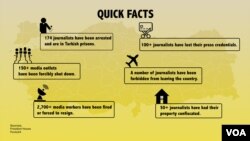As Turkish President Recep Tayyip Erdogan is pressing for answers in the death of Saudi journalist Jamal Khashoggi, who was allegedly killed in the Saudi consulate in Istanbul last month, some analysts are pointing to the dozens of journalists currently kept in Turkish prisons as proof of a double standard.
"The press freedom environment in Turkey has been very dire for several years now and, unfortunately, it is not getting any better. Turkey is the leading jailer of journalists in the world," Gulnoza Said, the Committee to Protect Journalists' (CPJ) Europe and Central Asia program coordinator, told VOA.
There are conflicting reports about the exact number of journalists imprisoned by the Turkish government.
According to CPJ's 2017 report, there were at least 73 journalists imprisoned across Turkey.
But Said said that though the number may differ depending on how the data is tracked, the fact is Turkey has been cracking down on journalists for several years.
"The fact [is] that there are more journalists behind bars in Turkey ... than in any other country, no matter what figures each organization gives," Said added.
Jamal Khashoggi
Following news of the disappearance of Washington Post contributor Khashoggi at the Saudi consulate in Turkey last month, Erdogan has emerged as a staunch advocate for the prosecution of those involved, pushing for the investigation to be carried out by Turkish authorities.
"The fact that Jamal Khashoggi is an internationally renowned journalist, aside from his Saudi identity, also puts an international responsibility on us," Erdogan told Turkish lawmakers in late October. "Turkey, as the representative of the world's common conscience along with its own sovereignty, is following up on this issue."
Slain journalists
Despite Erdogan's rhetoric of bringing those responsible for the death of Khashoggi to justice, some civil society advocates point to a number of journalists who were killed in Turkey and whose cases have yet to receive similar attention by Turkish authorities.
"When we talk about Khashoggi and his murder in the Saudi consulate in Istanbul, we also have to remember people like them [journalists killed in Turkey]," Caroline Stockford, a coordinator for the Vienna-based International Press Institute (IPI), told VOA.
She named several prominent journalists killed in Turkey since the 1990s, including Hrant Dink, Ugur Mumcu, Musa Anter and Metin Goktepe.
"If they [the Turkish authorities] are determined to resolve the Khashoggi murder, I would like to see equal resolve in the solving of murders of journalist citizens of Turkey," Stockford added.
According to CPJ's data, 25 journalists were killed in Turkey between 1992 and 2018, and 16 of them "have been murdered with impunity."
Spike in crackdown
Stockford pointed to a spike in the crackdown on journalists in recent years.
"Turkey has been through these periods of oppression of media before, but I don't think it's ever been quite as bad as this," she said.
Stockford said journalists are subject to prosecution for simply doing their jobs.
"They are also punished with fines for insulting the president. They're being attacked from every angle, you could say, but they still survive," Stockford added.
Gurkan Ozturan, the executive manager of Dokuz8news, a Turkey-based citizen-journalism network, says he is familiar with the pressure from Turkish authorities.
"Our institution has been shut down in 2016 and our account on Twitter has been shut down by Twitter in 2016 again, and then we had retrieved it back," Ozturan said.
"Our news coordinator has been sentenced to 10 months in prison for a piece of news he has written three years ago [for a different news organization], but right now he is working for us and he has received the sentence," Ozturan added.
Foreign journalists
The media landscape is also challenging for foreign journalists operating from Turkey.
A Turkey-based American journalist, who spoke to VOA on condition of anonymity, said the main challenge for foreign reporters is uncertainty about what could potentially put them on the radar of Turkish officials.
"Every time a group of us foreign journalists meets, the topic of discussion usually ends up with trying to figure out why the latest journalist was deported from Turkey. We're always trying to figure out why someone got in trouble," the reporter said.
Government stance
Turkish officials defend the country's record on press freedom and charge that they do not target journalists because of their work.
During a joint press conference in May with British Prime Minister Theresa May, Erdogan said some journalists were being investigated for terrorism-related charges.
"Are we supposed to call them journalists just because they bear the credentials and identity cards? Currently, the Turkish judiciary is prosecuting and sentencing individuals who have been associated with terrorism and involved in terrorist actions," Erdogan told reporters.
Credentials
The process of obtaining a press card in Turkey is closely controlled by the president's office.
"It is the presidential office that issues these press cards, but unfortunately in the last decade, it has become almost impossible for anyone except for the pro-government media to get hold of a press card." Ozturan of Dokuz8news said.
The renewal for the press card requires foreign journalists to submit their previous work.
"They had printed out some of my articles, not just the ones that I've given them for the press card but also other articles that they had found, and they had highlighted some words, and they wanted to talk to me about why I was using some certain terms instead of some other terms," the American journalist told VOA.






